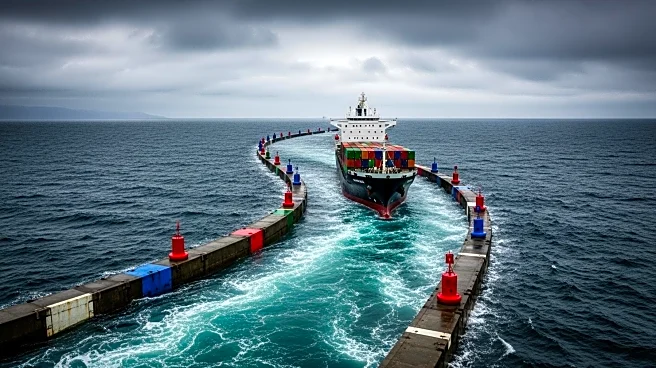What is the story about?
What's Happening?
The U.S. Federal Maritime Commission has initiated a review of seven key maritime chokepoints, including the Strait of Gibraltar, to identify regulations and practices that may create unfavorable shipping conditions. This move is part of a broader strategy by the Trump administration to counter China's influence in global maritime infrastructure. The administration is concerned about China's extensive network of port investments, which are seen as a potential threat to U.S. national security. The review aims to bolster America's commercial maritime presence and address risks associated with global shipping routes. The administration is also considering measures to support U.S. or Western firms in acquiring Chinese stakes in strategic ports.
Why It's Important?
This initiative reflects growing U.S. concerns over China's maritime dominance, which could impact global supply chains and national security. China's control over significant port infrastructure is perceived as a strategic advantage that could be leveraged in geopolitical conflicts. The U.S. aims to reduce its reliance on foreign ports and ships, which is seen as excessive and potentially compromising in times of conflict. By increasing its maritime presence and encouraging domestic shipbuilding, the U.S. seeks to secure its logistical capabilities and counter China's Belt and Road initiative. This could lead to increased tensions between the two superpowers, affecting international trade and diplomatic relations.
What's Next?
The U.S. is expected to continue its efforts to counter Chinese influence by building alliances and partnerships to strengthen its position in key port areas. The administration may implement additional measures, such as imposing fees on Chinese-built or flagged vessels at U.S. ports. There is also potential for increased scrutiny and regulatory actions against Chinese investments in strategic maritime locations. These developments could lead to further diplomatic engagements and negotiations with allies and partners to align on maritime security strategies.
Beyond the Headlines
The review and subsequent actions could have long-term implications for global maritime trade and security. The focus on reducing Chinese influence may lead to shifts in international shipping routes and alliances. Additionally, the emphasis on domestic shipbuilding and maritime infrastructure could stimulate economic growth and job creation in the U.S. maritime industry. However, these efforts may also provoke retaliatory measures from China, potentially escalating trade tensions and impacting global economic stability.
















